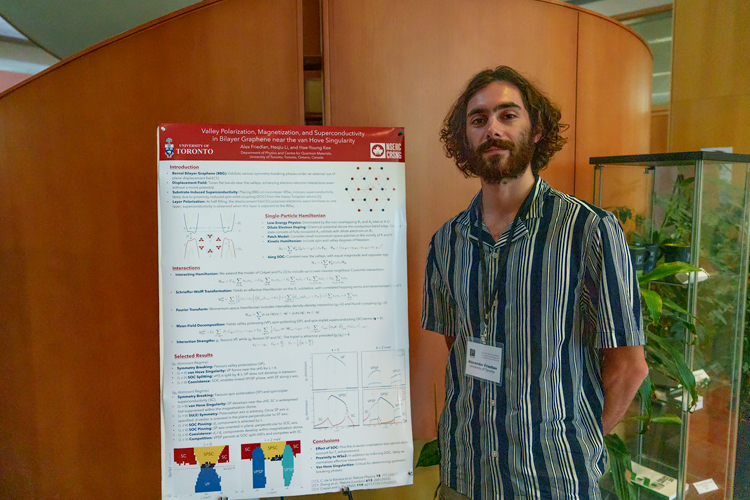This past August, some of the world's most brilliant minds in quantum information gathered at the Fields Institute for Research in Mathematical Sciences for CQIQC-X, the tenth biannual conference of the Centre for Quantum Information & Quantum Control (CQIQC).
The week-long event brought together 120 leading experts in the field, mid-career and new researchers, and students to explore and share their expertise in quantum-computing, -materials, -communication and -sensing.
A highlight of every conference is the awarding of CQIQC’s John Stewart Bell Prize for advances in quantum mechanics. This year the honour was bestowed on John Preskill, Richard P. Feynman Professor of Theoretical Physics from the California Institute of Technology.
“The conference is very successful at fostering collaboration between U of T researchers and the international scientific community ,” says Dvira Segal, CQIQC director and a professor in the Department of Chemistry.
“And this year was no different,” she says. “Attendees gained an appreciation of U of T’s broad strength in quantum science. They’ve developed a connection to the university and the centre. Many will return for future visits, pursue collaborations and offer our students opportunities for advanced training in their institutions.”
According to the lead organizer of CQIQC-X, Professor Hans-Arno Jacobsen, “I found this year’s conference exhilarating and deeply enriching. It truly stood out for its remarkable breadth and depth, rigorously exploring the fascinating interplay between the physical phenomena underpinning quantum effects and the sophisticated control of qubits.
“From groundbreaking discussions on qubit manipulation to the cutting-edge software stacks that bring quantum computing to life, every presentation underscored how the pieces of the puzzle are coming together to enable true quantum information processing,” he says. “It was an inspiring showcase of how far we’ve come and what lies ahead in this transformative field!”

The conference also provides an important opportunity for students pursuing a career in quantum disciplines.
“Students benefit from the opportunity to talk directly with leading researchers in the field,” says Segal. “And the diversity of topics covered allows them to learn about the breadth of recent exciting advances in quantum sciences and technology, as well as build their scientific network.”
Pria Dobney is a second-year graduate student in the Department of Physics and a member of the CQIQC community. She spoke with attendees about the quantum optics research she is doing with Aephraim Steinberg, a professor in the Department of Physics and CQIQC.
“The research I've been talking about today is related to how we can use photons to create different states of light that can help us sense things better,” she says. “We’re trying to exploit the polarization of single photons to help sense a change in the state we’ve created.”
The 2024 gathering is the first CQIQC conference for Dobney. “I'm really enjoying it,” she says. “It’s a chance to hear different talks about many topics. And I'm really enjoying the poster session. It’s a great opportunity to meet new people and talk to them about their research.”
Alex Friedlan is a graduate student in the Department of Physics and a member of the CQIQC community who presented a poster about his research, supervised by Hae-Young Kee, a professor in the Department of Physics and CQIQC. The work deals with superconductors — materials that offers zero electrical resistance at temperatures near absolute zero.

“People have been trying for years to achieve superconductivity at higher and higher temperatures in order for its applications to be more practical,” says Friedlan. “So, we’re looking at what’s referred to as unconventional superconductivity that occurs in graphene — a material made of a single layer of carbon atoms — at relatively high temperatures.”
As for the conference, Friedlan says, “It’s great. I’m meeting new people. The talks have been excellent. And I'm learning a lot about quantum computing, an obviously exciting field.”
Adrien Devolder is a research associate in the Department of Chemistry and CQIQC. He has been investigating interference occurring during collisions of molecules, a topic with ramifications for the development of quantum computers.
“Currently, there are collisions between molecules that decrease the capacity of quantum computers. So, we were looking at reducing the number of collisions and reducing the decoherence they introduce into the system.”
About the conference, Devolder says, “What I liked is that it's very diverse — with topics about all sorts of quantum technologies. The first day was about photonics. There were also talks about applications coming in the near future. I enjoyed that the conference gave a broad picture of the field right now.”
The conference is just one part of CQIQC’s broader mission. The centre also funds endowed postdoctoral fellowships and summer student scholarships; organizes workshops, seminar series, enhanced learning experiences and industry internships; coordinates the development and teaching of graduate courses in quantum science; and handles internships for students in the quantum computing industry.
Says Segal about the effectiveness of the centre’s initiatives, “We are sure to see new collaborations and advancements to the field which were sparked by this gathering.”

